
Truck trailer safety got in the focus of heavy vehicle safety and RTA reacted in 2017 to the increased number of accidents involving articulated trucks. The driving school curriculum got upgraded and will see an increase the number of theory and practical lessons in the heavy vehicle training program. Additional classes will exclusively focus on the driving skills required for articulated heavy vehicles.
Theory classes will cover topics like general maneuvers, harsh braking, handling emergency and accident situations.
The practical training will also involve parking of the articulated vehicle, the coupling and the decoupling of the trailer from the main body as well as reversing on a 40-feet trailer.
The upgrade will require the driving schools to procure the 40-feet trailers as well as water tankers to provide the additional lessons. Driving schools will have time till the end of 2017 to gradually implement the program when the course will become mandatory.
Practical Tips for day-to-day Trailer Safety:
- Make sure trailers are properly hitched to the towing vehicle. Use safety chains and attach the lighting connector.
- Make sure signal lights work properly.
- Inspect tires and wheel bearings before each use. Make sure bearings are properly lubricated.
- Inspect brakes daily and make sure all connections are intact.
- When towing a trailer down a hill use the same gear and speed as when going up the hill.
- Make sure tilt beds are in the locked position before moving.
- Make sure that approaches and bridges are adequate to carry the weight of a loaded truck.
- Be aware of children in the area. Before moving a truck know where the child is at all times.
- Load and unload on level surfaces. Always make sure the brakes are locked before loading.
- Use tie downs or chain binders to secure loads to the trailer. Check bindings after you traveled some distance to be sure the load has not shifted.
- Load trailers properly. Put about 60 percent of the load toward the front. Too little weight in the front will cause the trailer to fishtail. Too much weight will cause the hitch to drag and may raise the front of the towing vehicle, which reduces steering control.
- Keep decks free of dirt, oil, and debris. Steel decks can be slippery when wet, and extra caution is needed when loading and unloading.
- Do not overload the trailer. Make sure the truck will be able to handle the load. Check the owner’s manual of the truck for gross vehicle weight and other information regarding towing capacities.
- Be aware of the characteristics of the load that is being carried. Livestock will have a tendency to shift during turns while in transport, liquids will slosh if the tank is not full, and high loads may come into contact with power lines or tree branches.
- Load and unload equipment using a solid loading ramp. Trying to drive onto a trailer or truck from a roadbed is risky and has been a cause of many accidents.
- Before loading a truck or trailer be sure to use wheel chocks to prevent the truck from moving while being loaded.
- Make sure load clears overhead obstacles such as power lines, bridges, and overpasses.
- Only raise a loaded bed on level ground. A raised bed rises the center of gravity. Side overturns are common on sloped ground or when a truck makes a turn with the bed raised.
Technological innovation plays a key role in Safety, Effectiveness and Fuel & CO2 Reduction.
Electronic Braking System (EBS-E): Customizable central platform for the intelligent control of more than 40 functions that enhance trailer efficiency and safety.
Trailer Anti-Lock Braking System (ABS): prevent a vehicle’s wheels from locking in the case of excessive actuation of service braking system, especially on slippery roads.
Foundation Brake: Innovative lightweight air disc brake adapted to trailer needs
Trailer Air Suspension: From conventional air suspension to the latest electronic air suspension, automatic lifting to smart levelling – it’s all here. Air suspension is often used in place of conventional steel springs. The purpose of air suspension is to provide a smooth, constant ride quality by self-leveling. WABCO’s air suspension components and systems deliver further unique features.
Theft prevention: high performance security systems in a range that includes variable locks, fixed locks and vehicle securing devices tasked with preventing unintended movement of trailers.
Trailer Immobilizer is an electronic locking system with high security that blocks the wheels of a parked trailer, to help prevent theft, unauthorized use or erroneous pick-up by the wrong driver. It also increases security and safety when the trailer is parked on a slope.
Rollover Stability Support helps prevent vehicle roll-over within physical limits.
Emergency Brake Alert will automatically flash the trailer’s stop lights during hard braking to warn trailing drivers in order to reduce the risk of rear-end collisions.
Safe Start function automatically brakes the trailer when the driver begins to drive off with a trailer still in loading or unloading mode. This innovative function is specifically designed for tipper and tanker trailers.
Tilt Alert warns the driver if a lifting Tipper reaches its physical limits of stability to prevent it from tilting over.
Intelligent turn functions increase the turning radius of the trailer.
Trailer Aerodynamics devices offer significant fuel savings and CO2 reduction on long range distances at highway speeds.
Rear blind spot detection system that automatically stops the trailer in the event of an imminent collision.
Tire monitoring system.
Smartphone vehicle systems monitor: Innovative technology that enables users to check vehicle systems, monitor and control trailer conditions – all from a smartphone.
Sources: http://www.wabco-auto.com/wabco/; http://nasdonline.org/1678/d001578/truck-safety-preventing-accidents-with-trucks-and-trailers.html
Share your story









Pingback: Serious truck accidents down in UAE but can improve – Middle East Construction News
Pingback: 'First-Ever' UAE Truck Trailer Safety Conference | Yesgulf
Pingback: 'First-Ever' UAE Truck Trailer Safety Conference | BAWS.AE